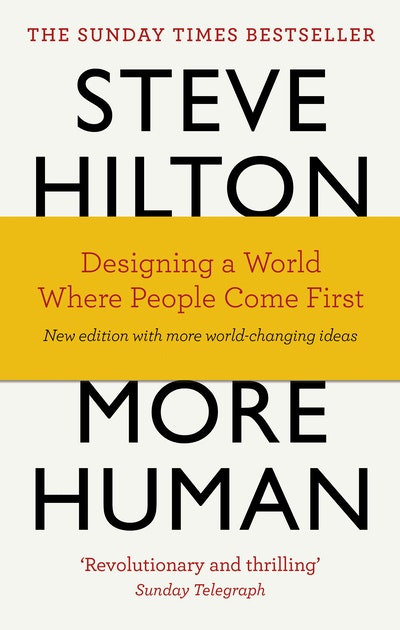More Human
Designing a World Where People Come First
- Published: 21 May 2015
- ISBN: 9780753551523
- Imprint: Virgin Digital
- Format: EBook
- Pages: 560
More Human by Steve Hilton is a very timely book and a powerful call for change in how we measure success and how we value what is most important in our lives. We need a more human way of living and, in this compelling book, Steve Hilton shows us how we can achieve it.
Arianna Huffington
Hilton is the leading modern day exponent of a humanist tradition dating back 2,500 years. His book is a powerful manifesto of sanity in a world in which the human dimension is under ever greater attack from forces that appear to swamp it.
Anthony Seldon
Hilton convinces us that to solve problems we need to work bottom up from the human scale, rather than top down from abstract ideas. One of the most important things people are looking for in their lives is kindness, something that is simply not captured by any of the systems governments use today. He urges us to fight the commodification of policy-making and make things work on a specific, human level.
Nassim Nicholas Taleb
The greatest asset that any organisation has – whether in government, business or philanthropy – is people. Yet too often, decision makers treat people more as an abstraction than an asset, leaving those they serve and employ feeling disconnected and disillusioned, and leaving major social and economic problems to fester. More Human picks apart this problem and challenges leaders in every field to look for innovative new solutions by looking people in the eye. You don’t have to agree with every prescription Hilton offers to recognise the value of his approach.
Michael Bloomberg
Revolutionary and thrilling
Sunday Telegraph
Scintillating
Independent
A provocative book that challenges us all to reclaim our lives from a distant elite
The Sunday Times
A powerful and authentic voice … captivating
Private Eye
Hilton’s plea will strike many chords with readers
Guardian
More Human in parts, is bolder, more unabashedly moral than any by Labour insiders.
Independent
I was both startled and then seduced by his words and ideas … [a] globally respected thinker
Independent
A cri de coeur about the dehumanisation of modern government and the corrupting of the ruling class
The Economist


